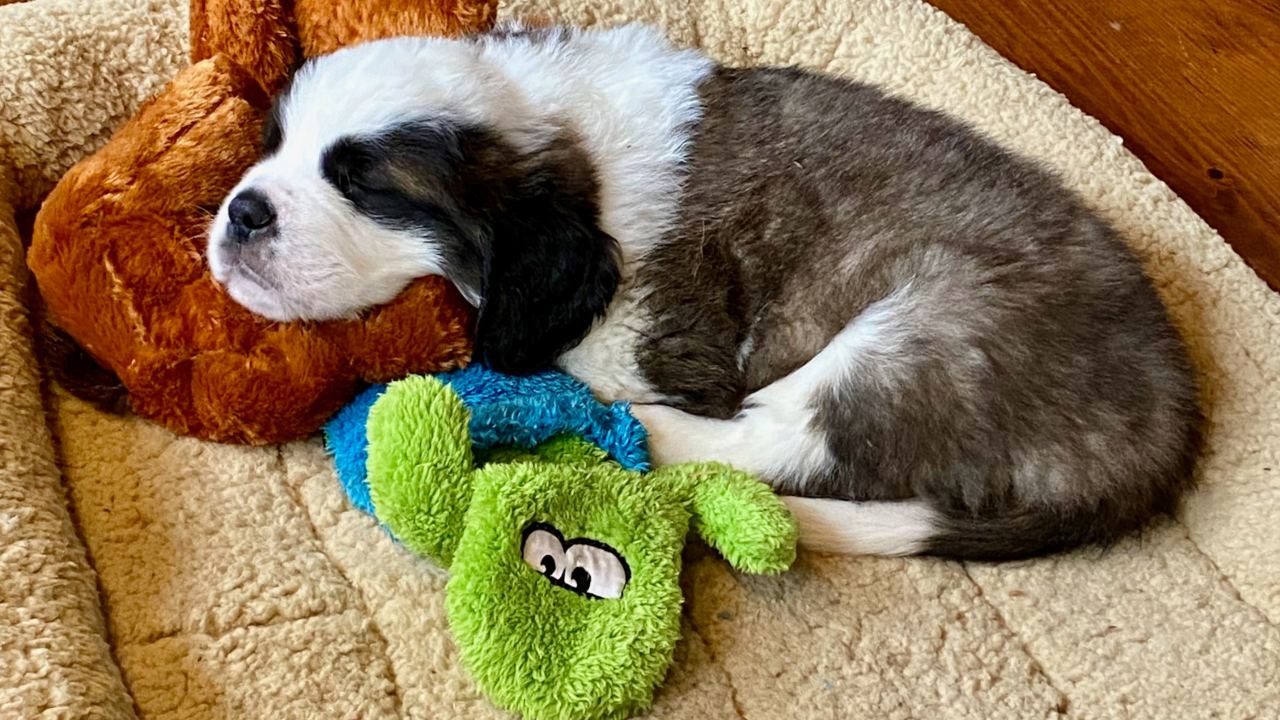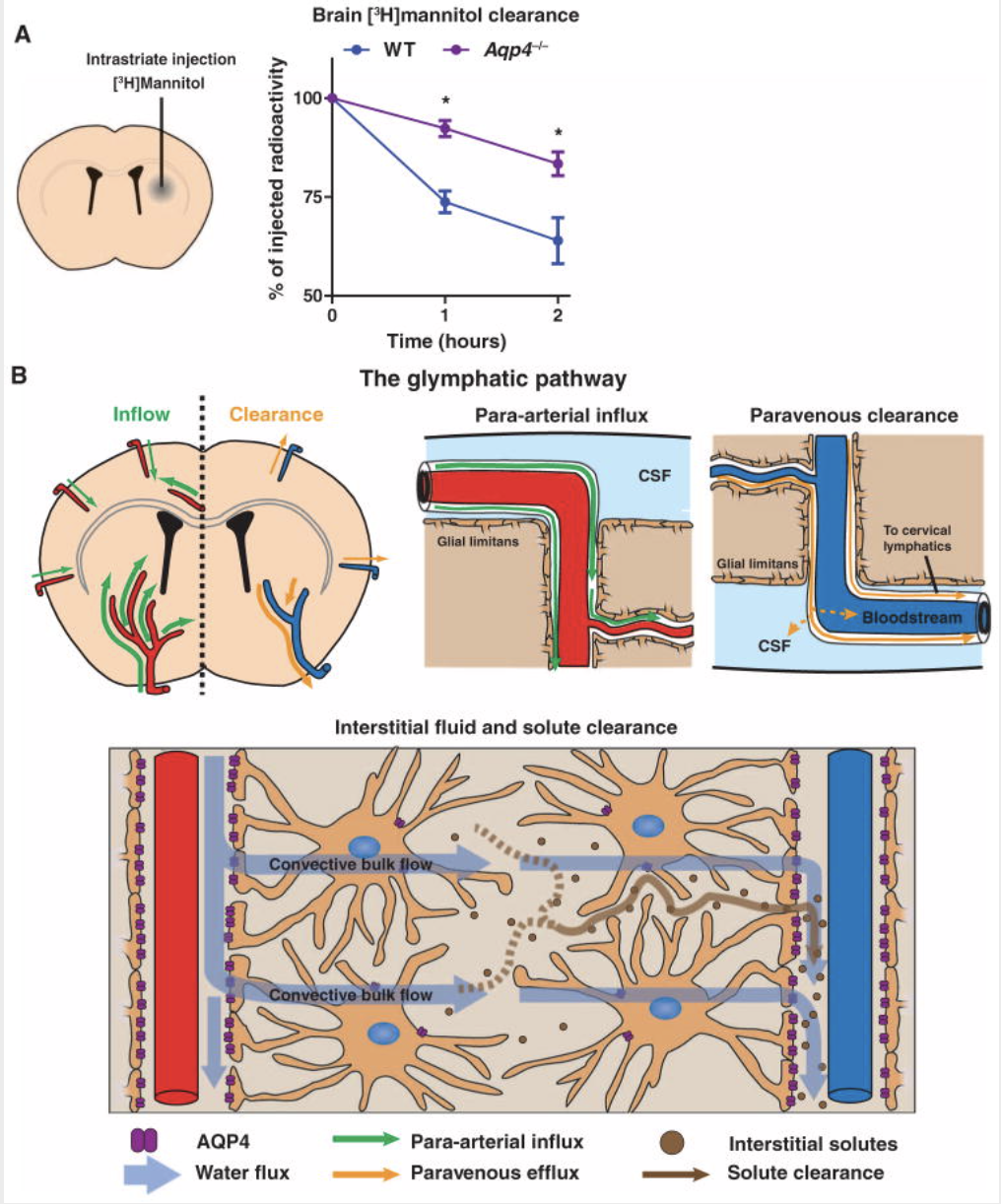#004 The Core Four: Sleep
Jan 22, 2023
[Image: 7 week old sleeping Ripple 🥰 ]
Your brain has a sewage system that needs your attention.
In 2012, scientist at Rochester University discovered a cleaning mechanism in the brain that occurs during sleep. It is called the Glymphatic Pathway and acts as a sanitation system that initiates when we enter into deep sleep. The glial cells in the brain remarkably shrink up to 200% which makes room for cerebral spinal fluid to fill the brain and wash out “metabolic debris” consisting of potential neurotoxins, soluble proteins and metabolites that have accumulated throughout the day.

Image Credit: Iliff et al., 2012
This is important because current data suggest a strong relationship between quality of sleep and neurodegenerative diseases such as Alzheimer’s.
Matthew Walker, preeminent Sleep Scientist, and author of the bestselling book “Why We Sleep”, stated it this way:
“Based on the weight of the data that we have, the evidence, I think it is causal. I think that sleep, at this stage, may be one of the most significant lifestyle factors that determines your risk ratio for Alzheimer’s disease. I feel the causal evidence for that now in humans and animals is strong enough to make that statement. And I don’t make that statement lightly.”
This is critically important for women because we are 2x more likely to develop Alzheimer’s than men.
I’m not aware of any studies but common sense would tell you that if women’s sleep quality suffers during child rearing and then again for 7-10 years during menopause, yeah, that may be affecting these numbers.
Let’s look at how hormone levels during menopause uniquely affects sleep.
There are 4 specific hormones at play: estrogen, progesterone, melatonin, and cortisol.
The first 3 plummet during menopause while the last one, cortisol, tends to rise.
Low Estrogen:
- Decrease REM sleep, which is important for memory, mood, and learning
- Increase the time it takes to get to sleep (sleep latency)
- Increase the number of awakenings after sleep occurs
- Decrease total sleep time
- Disrupts regulating body temperature during sleep causing hot flashes
- Dysregulates neurotransmitters such as serotonin that are important for controlling mood.
Low Progesterone:
- Progesterone has a sedative effect so when levels drop you don’t feel as sleepy.
- Stimulates respiration during sleep, so low levels can increase sleep apnea a finding seen in menopausal women
Low Melatonin:
- known as the ‘sleep hormone’, it decreases dramatically during menopause. Melatonin doesn’t put us to sleep but it’s involved in regulating our body clock and sleep/wake cycle.
- At low levels it affects our sleep efficiency by reducing the signal that it’s time to sleep.
Increased Cortisol:
- known as the ‘stress hormone’, during menopause levels of cortisol have been shown to be elevated at night-time, which can lead to increased feelings of stress and anxiety.
- cortisol levels also spike just after a hot flush, which can leave a woman feeling ‘on high alert’ during the night and make it difficult to fall back asleep.
Having gone through menopause and experienced its affect on my sleep; I've done a complete 180 on how I prioritize my wellbeing. I used to exercise to help me sleep, now I sleep to help me exercise and keep my nutrition on point.
That's right, studies show that poor sleep quality also leads to increased carb cravings.
One study found that underslept participants consumed on average and extra 600 calories from snacks. Yikes!
Honestly, I didn’t really need a study to tell me that. When I don’t sleep well I tend to eat way more crap. My energy and will power just isn’t there.
Beacuse of all the factors sleep tends to effect from the scariest diseases to aily quality of life, my over 50 mantra has become:
Protect your sleep like a SAVAGE.
So, how do we do that? There are tons of articles on proper sleep hygiene. I’ll list the what the scientific consensus suggest:
- View sunlight within 30-60 minutes of waking to help set circadian rhythm and boost Vitamin D
- Go to bed and wake up at the same time each day
- Avoid caffeine after noon
- Avoid alcohol in the evening, have a cutoff time of at least 3 hours before bed (my grandmother liked to “thin the blood” every evening with a little bourbon. She had one glass at 5 PM and that was it. She lived a vibrant life until 93 and was sharp as a tack.)
- Harmonize with nature, when the sun goes downturn down the lights
- Drop your room temperature to 65F
- Take a hot bath or shower before bed to drop your core body temp
Dangers of sleep medication:
Sleep medications like Ambien and Lunesta do not provide quality sleep. They are particularly disruptive to deep sleep and can create dependency issues. There is a difference between losing consciousness and getting good quality sleep. Sleeping pills basically make you lose consciousness. Long term use is concerning.
I could go on and on about the dangers of these type of sedatives. Women are particularly at risk because we have a harder time clearing these drugs which leads to prolonged daytime drowsiness, increased falls, and automobile accidents. Not good.
Please, please talk to your Dr for alternatives if you are using regularly.
Some helpful Supplements 30-60 minutes before bed:
- 145mg Magnesium Threonate (I use Magtein it cross the blood-brain barrier and is easy on the tummy)
- 100-400mg Theanine (I trust Thorne brand)
Note on menopausal sleep disturbances.
If you have a hormonal deficiency, then these strategies may help but not resolve the sleep issues because the underlying cause is low hormones. I recommend speaking to your Dr about HRT or herbal therapies. Please don’t suffer. Sleep is too important!
With love and gratitude,
Anna
SUBSCRIBE FOR WEEKLY TIPS, TOOLS & STRATEGIES
We hate SPAM. We will never sell your information, for any reason.


